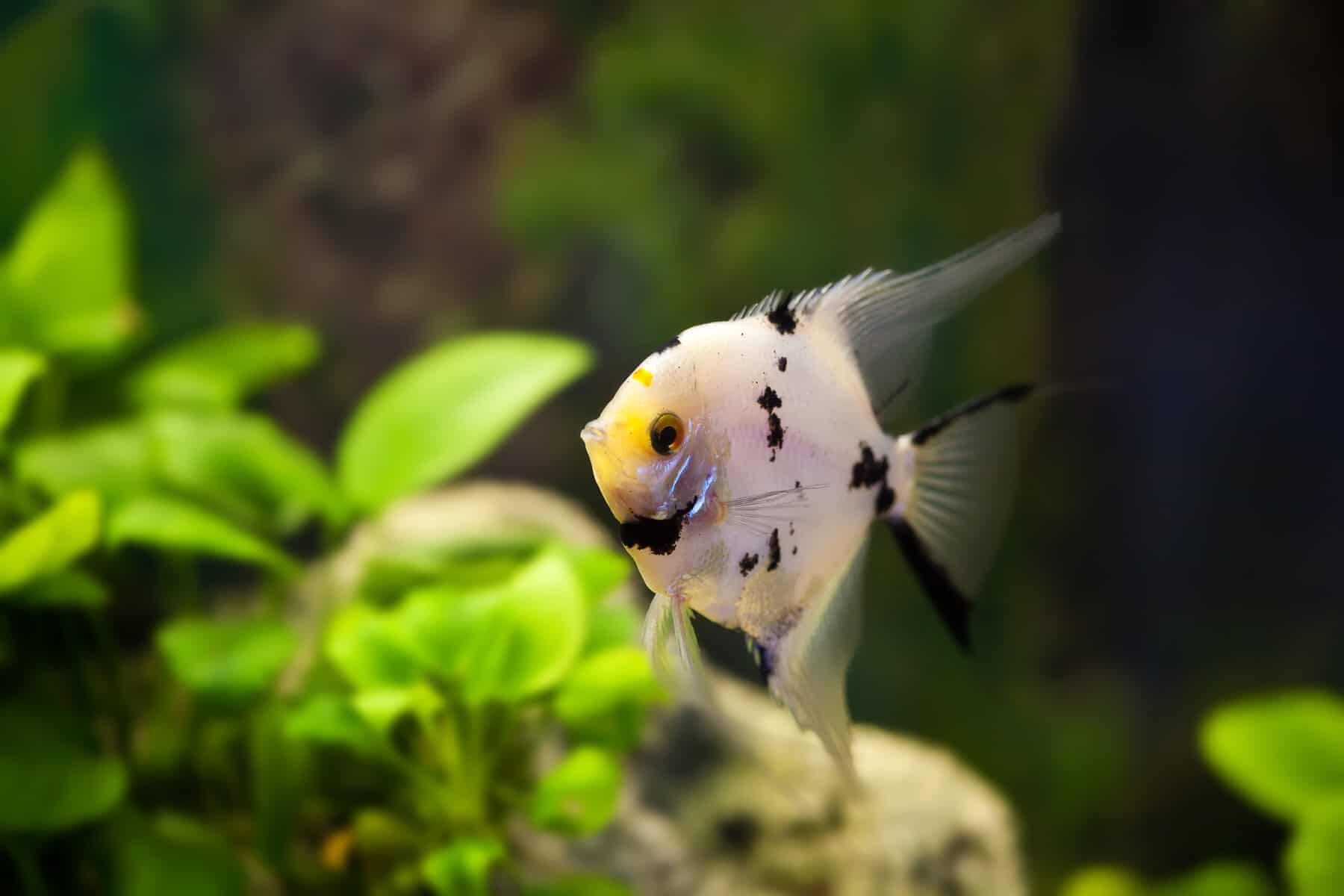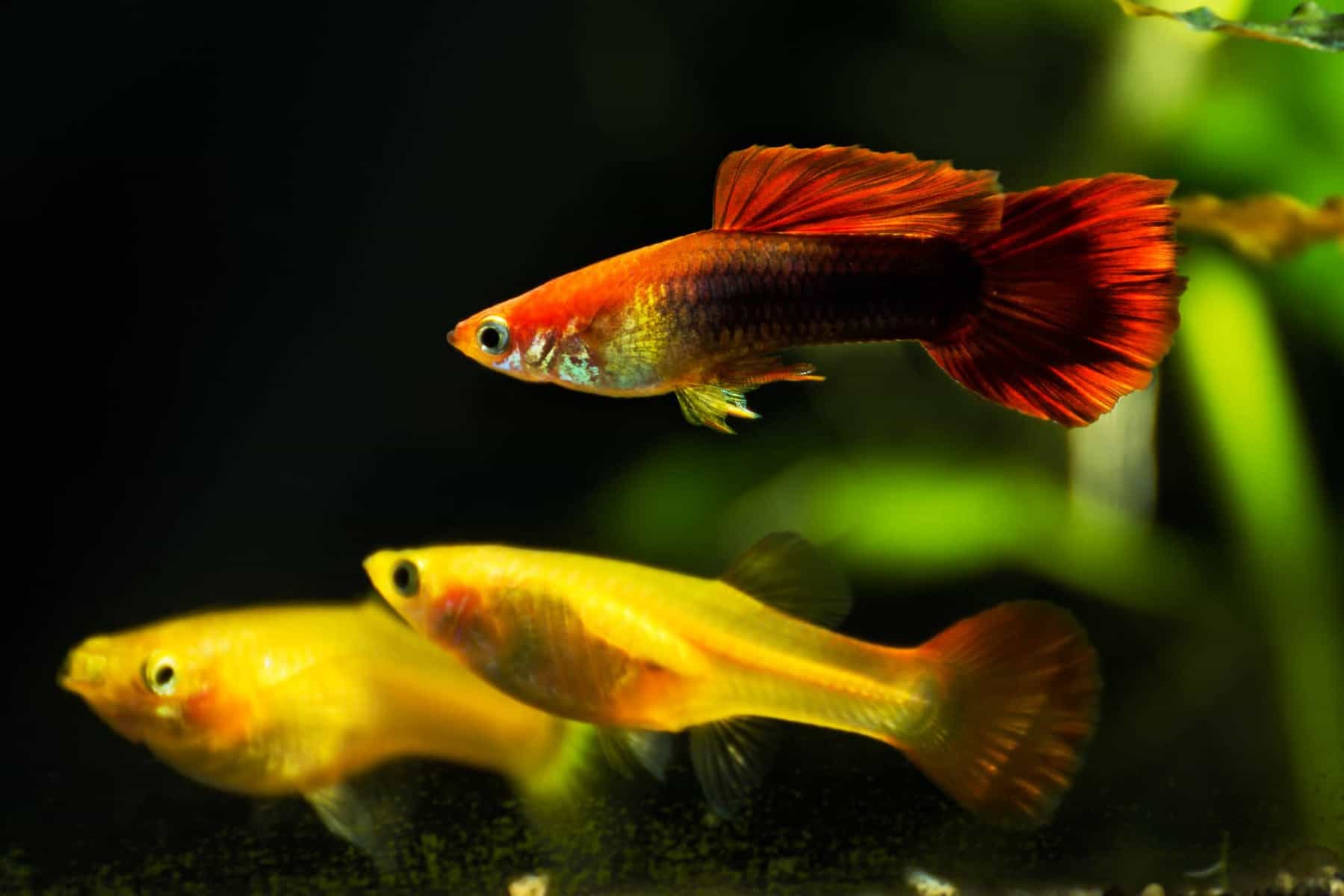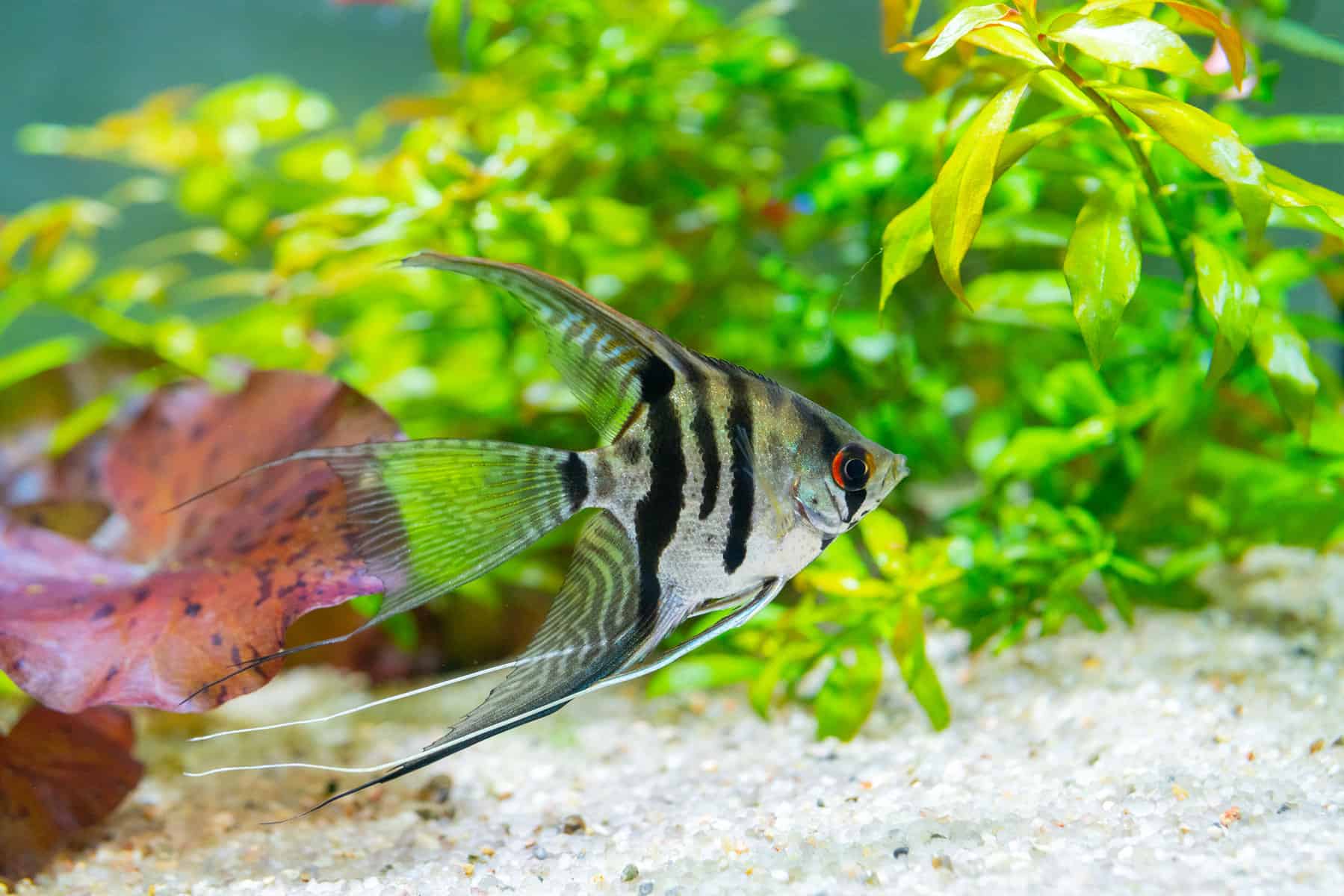[ad_1]
Guppies and angelfish are two popular tropical fish species that you’ll see for sale in most fish stores. Now, you might think that these two fish would make fabulous tank mates.
After all, angelfish are elegant, graceful fish that seem to cruise effortlessly and peacefully through the water column, while adult guppies come in rainbow colors, amazing patterns, and different forms. What a perfect combination for the ultimate viewing experience!
So, can you keep guppies and angelfish together in the same aquarium?
Well, yes, you can, but we recommend that you don’t!
Keep reading this guide to learn why guppy and angelfish, unfortunately, don’t make the perfect combination.
Species Compatibility
The first thing you must consider before adding any new fish to your aquarium is whether they will be compatible with the species you already have.
Compatibility is critical if your tank is to a harmonious environment with happy, thriving fish. After all, there’s nothing worse than being forced to live with neighbors you don’t get along with!
In the wild environment, the fish and other creatures that live there understand their natural place in the pecking order or food chain. However, it’s a different matter in an aquarium, where space is limited, and the food supply is restricted to specific times.
So, you can see that a combo of territorial, semi-aggressive fish and docile, shy ones would not be a marriage made in heaven in your tank.
For example, I once kept angels and guppies in a community aquarium with several other species. Although my tank was plenty large enough to accommodate everyone, I ended up moving my two angelfish to another tank, as the male became very aggressive when spawning and persisted in attacking the other fish.
Water Parameters
In addition, all the fish you choose must enjoy the same basic water parameters, i.e., temperature, pH levels, and water hardness.
So, if the fish come from totally different natural environments, they probably won’t do well as tank mates.
Diet
From a practical point of view, it’s much easier if all your fish eat a similar diet. That means you won’t need to buy separate food for numerous different species, which can work out costly in terms of expense and time.
Space
Angelfish are large creatures that can grow to around 3 inches long and 6 inches tall, so they need a tank of at least 40 gallons, preferably larger, depending on how many fish you have and what tank mates you want to keep.
Guppy vs. Angelfish – Water Parameters
There’s no point in keeping two fish species in the same tank if they need completely different water parameters. So, how do guppies and angelfish compare?
Temperature
Guppies and angelfish are both tropical species that need warm water.
Guppies like water temperatures between 72o and 78o F. Interestingly, cooler temperatures slow the guppies’ growth, but the fish tend to live longer, whereas warmer water encourages faster growth but usually leads to a shorter life expectancy.
Angelfish prefer warmer water, ideally between 78o and 84o F. So, in theory, if you kept guppies and angelfish together, the water temperature would need to be around 78o F to keep both species happy.
Water Chemistry
Guppies like water that contains plenty of minerals, with a neutral pH of around 7.0.
Angelfish do best in soft, acidic water and can tolerate a water pH of between 6.8 and 7.8, so the two species are fairly compatible when it comes to water chemistry.
Guppies With Angelfish – Temperament and Behavior

Although angelfish and guppies can tolerate similar water conditions, their behavior and temperament are totally different ball games.
Guppies are peaceful fish that get along with their own kind and other shoaling fish species. Sometimes, you might see some squabbling among males, usually when competing for the attention of females.
However, most of the time, your guppies are active fish that are happy to explore the tank, pecking bits of food from your plants and the substrate.
Territorial Angels
In comparison, full-grown angelfish are classified as being semi-aggressive fish, especially in adulthood. That behavior is down to the fish’s territorial nature.
In the wild, there’s plenty of space for the fish to get out of each other’s way, establish a territory, and choose a mate. However, that’s impossible in an aquarium where space is at a premium, and smaller fish, such as guppies, are often bullied.
Angelfish are large fish that will inflict damage on their tiny companions and often seem to regard small fish as an irritant not to be tolerated. That said, angels can get along okay with larger fish of a similar temperament.
Predator and Prey
Angelfish and guppies are omnivores enjoying a diet containing plant matter, algae, and meaty protein. That’s great news, as it means you can feed the two species a similar diet.
However, angelfish are opportunistic predators that will prey on other, smaller fish. That means a large adult angelfish could easily view your small guppies as lunch!
Of course, you can take steps to prevent that by ensuring there’s plenty of food on offer, including frozen meaty proteins. That way, your angels will get their meat fix without resorting to eating your guppies.
Breeding Issues
One of the big fun things about keeping guppies is that these livebearers are prolific breeders, and watching the fry grow into adults of various patterns and colors makes a great project, especially for kids.
Unfortunately, Angelfish will almost certainly gobble up any fry they can grab, potentially leaving you nothing! However, most omnivorous fish will happily make a meal of fish eggs and fry, so the angelfish are not the only culprits here.
Fortunately, guppies reproduce at such a rate you’ll never be short of guppy fry. You can save the baby guppies by removing your pregnant females into a separate tank until they give birth. Then, return the adults to your main tank so the fry can grow safely.
Stress
Living in an environment where much larger fish hassle you, and your babies are regularly eaten, is undoubtedly stressful for the guppy fish.
But, spare a thought for the angelfish! Defending a territory from perceived invaders who might seek to steal your patch, your mate, and your food is not conducive to relaxation.
Stress impacts the fish’s immune system, leaving the creature open to attack by parasites and bacteria. So, in a tank where stress levels are high, disease outbreaks are often frequent, and mortality levels are higher than they should be.
Expensive Mitigation
If you’re still determined to keep guppies and angelfish together, there are some steps you can take to mitigate the risk of doing that and reduce the stress both species are likely to suffer.
The primary cause of conflict between the two species is caused by the angelfish’s territorial instincts.
So, by increasing the available space in the tank, you can reduce the problem to some extent. But that means investing in a tank of at least 120 gallons so that the angelfish have plenty of space and the guppies can keep out of their way.
You can help the angelfish to adopt a territory by using strategically-placed decorations, such as driftwood, stones, and twisted roots.
Your guppies will appreciate plenty of dense planting where they can take refuge if they want to, and guppy fry can hide amid the plant leaves to avoid being eaten by the angelfish.
What Are the Best Tank Mates for Guppy Fish and Angelfish?
So, you can see that guppies and angelfish share the same basic requirements when it comes to water quality and diet. However, their behavior and temperament make keeping the two species together somewhat impractical and stressful for everyone, including you!
Of course, there are plenty of fish species that make good tank mates for angelfish and guppies.
Guppies

Guppy fish get along with most of the peaceful, community fish species you find in the hobby. So, you could set up a tank containing guppies, tetras, danios, Endler’s, corydoras catfish, and gouramis.
Angelfish

As angelfish can be aggressive as adults, you need to choose tank mates that they cannot bully. The fish you choose should be around the same size as the angels or slightly larger to deter the angelfish from hassling them.
Ideally, the tank mate should be semi-aggressive but not too belligerent. You want a fish that will defend itself when necessary without being a fighter or a fin-nipper.
Sometimes, it works well if you choose bottom-dwelling fish as angelfish tank mates. Angels tend to spend most of their time in the middle to upper areas of the water column, so the two species won’t come into conflict.
With that in mind, here are a few fish that can make good tank mates for angelfish:
If you’re unsure what fish to choose as tank mates for your angelfish, the staff in your local fish store will be happy to advise you.
Final Thoughts
Did you enjoy our guide to whether you can keep guppies and angelfish together? If you found the article helpful, please take a moment to share it!
Unfortunately, angelfish and guppy fish don’t make the best tank mates. Angelfish tend to display territorial behavior as adults, and they will pick on the smaller, peaceful guppies.
However, since the two species share the same requirements when it comes to water parameters, it is sometimes possible to keep the two together in a very large tank. That said, the stress experienced by both fish can lead to disease outbreaks and early mortality.
Do you keep angelfish and guppies in the same tank? How do they get along? Tell us in the comments box below.
[ad_2]
Source link
